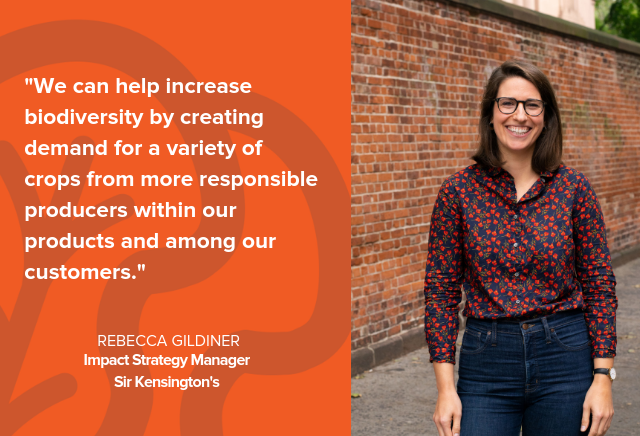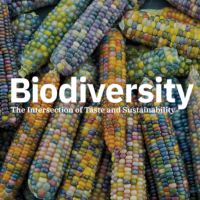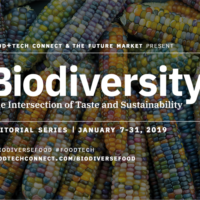
Food+Tech Connect and The Future Market are hosting Biodiversity: The Intersection of Taste & Sustainability, an editorial series featuring interviews with over 45 leading food industry CEOs, executives, farmers, investors and researchers on the role of biodiversity in the food industry. Read all of the interviews here.
Below, we speak with Rebecca Gildiner, Impact Strategy Manager at Sir Kensington’s, about how taste and cultural preservation drive Sir Kensington’s growing commitment to biodiversity. She talks about creating markets for diverse crops and building supply chains for unique ingredients that directly support smallholder farmers. She also talks about examining Sir Kensington’s existing supply chain to better understand it’s impacts and identify opportunities for improvement.
______________________
Danielle Gould: Is biodiversity a priority for Sir Kensington’s? If so, how and why?
Rebecca Gildiner: Biodiversity is important to Sir Kensington’s because taste is paramount to Sir Kensington’s. We believe the two are inherently linked, that is that biodiversity in the food system results in a myriad of flavors and culinary experiences. Is our mission specifically to create a product that enhances biodiversity in the food system? Not exactly, but a mission to bring integrity and charm to ordinary and overlooked foods through an innovation process led by taste means that we lean on a biodiverse food system to deliver on our promise. Sir Kensington’s also believes that the environment is a shared resource, and so protecting biodiversity is our responsibility as it is any other business who reaps the benefits of nature. Our combined values of environmental stewardship and exceptional taste mean that biodiversity is of the utmost importance to us.
At these early stages in our business, we’ve prioritized biodiversity with a baseline promise of being 100% Non-GMO Project Verified, and we were the first condiment brand to do so. While we realize the research is uncertain on the impacts of GMOs on biodiversity, we abide by a more precautionary principle that introducing foreign, genetically engineered plants into the natural environment could have detrimental impacts on ecosystems and wild plant genetics. We also believe that preserving traditional seed systems is vital to biodiversity, and these systems are currently at risk due to the increasing trend of seed patenting and genetic engineering controlled by large corporations rather than farmers. We also are concerned about the increased chemical use that these genetically engineered crops often encourage, which can harm species such as pollinators.
DG: How does Sir Kensington’s define and think about biodiversity? What does an ideal biodiverse food system look like?
RG: At Sir Kensington’s, we define biodiversity as the rich array of animals, plants, and insects that exist in complex webs of interaction within and across ecosystems. The food system is deeply reliant on biodiversity, where the strongest food production systems are biodiverse themselves and where all rely on adjacent biodiversity such as pollinators and decomposers. As a food company, we’re particularly interested in crop diversity. We believe the food system should encourage production of a wide variety of edible crops that provide diverse diets, comprised of diverse nutrients and tastes, and keep our food supply resilient. But we also consider the impacts of man-made food systems on biodiversity beyond the confines of the farm, such as the harm that deforestation and chemical application can cause to wild populations and waterways.
An ideal food system would look like many small polycultures rich in a diversity of life and plants. But this is likely too ideal, and our production system is under too intense of pressures to produce highs volume to see that mode of production scale. So today, we should at least strive for a system that values and produces a diversity of crops and limits harmful production practices in order to protect greater biodiversity and ecosystems.
DG: What is Sir Kensington’s doing or planning to do to promote biodiversity?
RG: Beyond our Non-GMO promise, we are gradually finding opportunities to create markets for diverse crops. Historically, Sir Kensington’s has succeeded in building out more sustainable supply chains such as Certified Humane Free Range eggs for our mayonnaise and aquafaba for our vegan mayo, a liquid by-product of cooking chickpeas that was once being thrown out and is now the star of our Fabanaise. Now going forward, we are thinking more about how to build out supply chains for unique ingredients that will support our upcoming innovations in global flavors and create demand for diverse food production.
We in part value biodiversity because we believe it preserves culture. That is, preserving agrobiodiversity means enabling the preservation of cultural traditions and flavors. Next year, as we focus our 2019 innovations showcasing global flavors, we hope to find ways to support production of diverse ingredients, especially through spices. We’ve already begun to do this through our Spice Kits. Through our kits, we are working in shorter supply chains that are directly supporting smallholder farmers, rather than less eco-friendly, large scale commercial farms. This is meant as a launching pad for our own supply chain, as we explore opportunities for new, shorter supply chains for underutilized spices or those grown with more agroecological practices. As a food company, we can help increase biodiversity by creating demand for a variety of crops from more responsible producers within our products and among our customers.
It’s also not just about a biodiverse food system, but also being cognizant of the impacts the food system has on biodiversity. For instance, deforestation is a significant problem in the food industry, most notoriously for soy and palm oil, that the food industry has a responsibility to stop. Sir Kensington’s is putting our own supply chain under a microscope to better understand our own impacts. When we discovered the challenges around avocados in Mexico and the industry’s connection with deforestation, among other social impacts, it became one of our supply chain team’s and my own top priority to find a more traceable, sustainable avocado oil supply chain. We continue to work hard on finding a solution, within a limited market and an exceptionally complex supply chain.
DG: What are the greatest challenges and opportunities your organization faces for creating a more biodiverse system, and what are you doing to overcome or capture them?
RG: As a consumer packaged goods (CPG) company, our supply chains are long and complex, meaning we’re often far removed from the production of many our ingredients. This makes traceability and transparency quite challenging in terms of knowing about biodiversity-friendly practices. The large and rapidly increasing volumes we need as a growing company also make traceability and production oversight even more challenging, and often means working with larger producers relying on monocultures to produce high volumes. And of course, the cost pressures of any CPG to provide a product that consumers are willing to pay for is always a challenge when it comes to sourcing in the most responsible way possible.
Sir Kensington’s has made efforts to combat these challenges, prioritizing close relationships with key suppliers such as our egg and tomato producers, by visiting their farms and choosing responsible, trustworthy partners, and by being 100% non-GMO verified. We are able to support cooperatives of small family farms producing our Certified Humane Free Range eggs, which feels like a step in the right direction. But still many other, more minor ingredients prove more challenging. It comes down to prioritization, and as a company with hundreds of ingredients we need to start somewhere. We focus on where the bulk of our money is going (i.e., our key ingredients) and thus where we have our biggest impacts, and on where the biggest risks are. We must acknowledge that we can’t do everything everywhere, but we don’t use that as an excuse for not always trying to improve and go deeper.
DG: What is the business case for products that promote a more biodiverse food system?
RG: Taste! Customers above all want products that taste good, and we know that to create good taste, we need a supply chain that’s rooted in biodiversity. The world’s farmers have lost 75 percent of their plant genetic diversity since the 1900s in the name of high-yielding, profit-maximizing, transportation-friendly crops–not necessarily those that taste the best. We still have a lot of work to do ourselves, and we continue to seek out suppliers with responsible production practices and ingredients bred for flavor. The more delicious our products, the better our business will perform.
DG: Does your average consumer care about biodiversity today? Why should they care? How do you (or will you) get them to care?
RG: We know that our consumers prefer values-driven companies who make responsible decisions for the environment and people. So we know that in theory, customers care about biodiversity because it’s better for the health of the planet. That said, customers might not always understand how biodiversity relates to them. The messages we are sent about biodiversity is often one of altruism–that we should care about the rainforest because it’s the right thing to do for the planet and because we should value ecosystems, plain and simple. But biodiversity, or a lack thereof, does affect us–it affects our food supply, our nutrition, our medicine–and is part of a complex ecosystem, the disruption of which we can’t really fully understand the impacts.
History has of course shown us the risks of dwindling genetic plant diversity. An entire population suffered during the Irish potato famine in 1850, caused by a blight that attacked the limited varieties of potatoes being grown. And today we face the threat against the incredibly popular Cavendish banana, a crisis which presents itself less than half a century after the devastation of the formerly most popular banana, the Gros Michel, attacked by a fungus against which it had no defense. I think consumers would care if their favorite foods disappeared from the grocery store, and so they definitely care about this form of agricultural biodiversity. It is these sorts of lessons we need to better communicate.
So while we do believe that our customers care, that’s not the only reason we care. Sometimes the reason we do things internally is not what we communicate externally. As alluded to earlier, our number one communication tool is taste. We believe diverse ingredients make our products taste better, which will drive people to buy them, and that it’s our obligation as a producer to make responsible choices. We’ll continue to do so while seeking out opportunities to educate consumers on why some, if not all, of those decisions are important.
DG: What are some of the most important things food manufacturers can do to support biodiversity? Retailers? Other key parts of the food supply chain?
RG: All of us food manufacturers need to do the legwork to familiarize ourselves with our supply chains, understand the implications of our purchasing and processing decisions, and set goals around improving them–continuously. This also means pushing for more traceability in an industry where that is not the norm. These decisions will often take more work and cost more money, which is why we need retailers to provide the education to consumers, and ultimately get their buy-in so that we can prove the economic viability of more sustainable supply chains. Retailers can also help lead the charge of encouraging manufacturers to source responsibly, creating downward pressure to improve the system as a whole.
As a system at large made up of policy makers, farmers, producers, retailers, and consumers, we all need to make better use of the land we already use to prevent deforestation and other land use change in the name of increased production for profit.
DG: If we get to a perfectly biodiverse food system, how would that change the typical selection of products we see in a grocery store?
RG: Hopefully that would mean a more colorful, diverse selection of more flavorful foods–and likely at higher prices if they were truly internalizing the cost of sustainable production.
DG: Are there certain products you would like to see more of in the food industry — either in foodservice or CPG — that would help promote a more biodiverse agricultural system?
RG: I believe that the food service industry has a real opportunity to get people’s taste buds to appreciate variety. According to the FAO, 75 percent of the world’s food is generated from only 12 plants and five animal species. Think of all the flavors we’re missing out on! By exposing more eaters to diverse fruits, vegetables, grains, and proteins, we can create demand for variety and incentive farmers to grow accordingly. For instance, I’ve loved seeing the rise of the Japanese sweet potato–a vegetable I’ve been fond of for years–and I know there are so many more varieties out there that can tantalize the eater’s tastebuds. Food service establishments have the opportunity to serve that first taste, and foster curiosity for what other tastes are out there.
DG: What investments need to be made to create a more biodiverse food system?
RG: National seed banks will be vital to preserve the immense biodiversity that comes out of traditional seed systems, and will be crucial to keep our food system resilient. We also need to invest more funding into protecting natural ecosystems such as forests, and in extension services and subsidies for farmers to help them reduce chemical use and incorporate other agroecological practices. Additionally, the private sector can create markets that incentivize farmers to grow a diversity of crops and pay more for better ingredients. At the end of the day, farmers will farm in a way that people pay them to farm. We need to create demand for a diversity of foods and realize that responsible, diverse production will often come at a higher price point.
DG: What is your vision for what a more biodiverse food system looks like in 10-15 years?
RG: I hope we can start to reverse and inch closer to the biodiverse food system that we once had. This will mean people enjoying diverse diets and producers not giving into pressure to produce in ways that harm natural ecosystems. I hope that our system invests more in supporting local seed saving traditions rather than looking to GMOs to save the world–a solution with unclear consequences. I hope that markets find a way to restructure capitalist priorities–that we can find a system that prioritizes taste and the environment over yield and profit, that enables food sovereignty and eliminates hunger. It might be the vision of an idealist, but I’m not sure our planet or global population can afford anything less.
DG: Anything else you want to share?
RG: I believe that there is a level of humbleness required from humans to truly value biodiversity. Despite so much scientific progress and many developments, we still know so little. Nature is vast and way beyond our current comprehension. There are literally millions if not billions of species we have not yet discovered, and tenfold the number of interactions amongst them that we don’t understand. So we must realize that we cannot possibly understand to the fullest the consequences of our actions when interfering with natural systems. The hubris of mankind will be our downfall: we are not isolated from nature, nor conquerors of nature, but are benefactors, servants, and friends of nature. We must work with it, rather than against it, which can prove challenging in a manipulative science like agriculture, but which can be done with more reverence for the environment than we’re carrying out now. We rely on nature immensely, and must treat it with respect and humbleness, for the sake of its longevity and our own.
Read all of the interviews here and learn more about Biodiversity at The Future Market.
_______________________
 Rebecca Gildiner, Impact Strategy Manager at Sir Kensington’s
Rebecca Gildiner, Impact Strategy Manager at Sir Kensington’s
Rebecca Gildiner is the Impact Strategy Manager at Sir Kensington’s, overseeing social and environmental impact across the business. Rebecca has 10+ years experience across the food system, from farm work and retail to waste management and food education. Prior to Sir Kensington’s, Rebecca received her Masters of Environmental Management at the Yale School of Forestry and Environmental Studies where she focused on food systems and corporate responsibility. She has supported sustainability strategy development for companies such as IKEA Food Services, Shake Shack, SustainAbility, and Foodprint Group.





